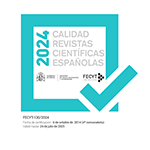Meus hic ratibus qui pascitur ignis (VAL.FLAC.2.658), o Cízico: un Héctor frustrado
Abstract
In the episode of Cyzicus, Valerius Flaccus problematizes the insertion into the epic poem of a tragic adventure, an erroneous night war between allies that, by means of hybris, confusion and subsequent recognition, takes the implied ones to the catastrophe. For this purpose, the author uses as fundamental trope tragic irony, as far as he sets the reader’s privileged knowledge of the story of the Argonauts against the ignorance of the prominent characters, whose heroic expectations will be frustrated. This way, the king who welcomes Jason dreams of personifying the Hector of the la Iliad, whereas the learned reader knows that he has to perform to the end the unsuccessful Cyzicus of the argonautic tradition.Downloads
##submission.format##
Licenza
La revista Cuadernos de Filología Clásica. Estudios Latinos, para fomentar el intercambio global del conocimiento, facilita el acceso sin restricciones a sus contenidos desde el momento de su publicación en la presente edición electrónica, y por eso es una revista de acceso abierto. Los originales publicados en esta revista son propiedad de la Universidad Complutense de Madrid y es obligatorio citar su procedencia en cualquier reproducción total o parcial. Todos los contenidos se distribuyen bajo una licencia de uso y distribución Creative Commons Reconocimiento 4.0 (CC BY 4.0). Esta circunstancia ha de hacerse constar expresamente de esta forma cuando sea necesario. Puede consultar la versión informativa y el texto legal de la licencia.








